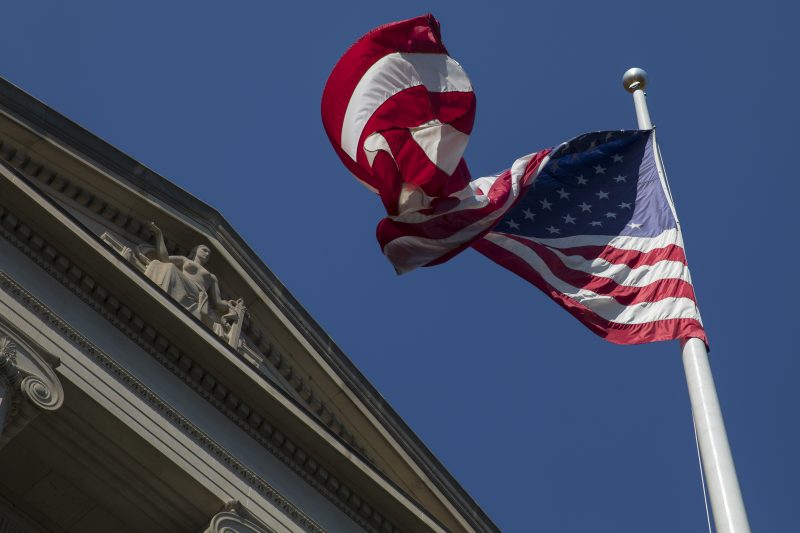The Justice Department has challenged three high-profile lawsuits filed in Texas against Biden administration policies, accusing state politicians of choosing small, conservative federal court divisions that have little relevance to their cases but nearly guarantee them a sympathetic judge.
It’s part of the administration’s first concerted effort to fight what some legal experts say is a growing problem of “forum shopping” — a strategy in which plaintiffs are alleged to cherry-pick judges they want to hear their cases, bucking the random assignment of judges that is considered a tenet of the American legal system.
One of the requests was denied. The other two are pending. In the fall, the Justice Department succeeded in convincing a Texas judge in a fourth case — involving a death-row prisoner — that he had no jurisdiction to rule on the matter.
In the three lawsuits over Biden administration policies, the attorneys general for Texas and a group of other states filed in rural federal courthouses, each staffed by a lone judge with a reputation for ruling against Democratic administration policies. In contrast, most federal court divisions across the country include multiple judges, who are assigned at random to cases as they are filed.
The Justice Department appeared to tread carefully in its requests, trying to assure the judges that the government believes they would be impartial but still asking them to transfer the lawsuits to a district with a more pertinent connection to the case. Even the perception of judge shopping, the federal government argued, could erode public trust in the justice system.
“Plaintiffs’ and other litigants’ ongoing tactic of filing many of their lawsuits against the federal government in single-judge divisions or divisions where they are almost always guaranteed to procure a particular judicial officer undermines public confidence in the administration of justice and warrants transfer in the interests of justice,” the department wrote in a motion last month seeking the transfer of a lawsuit related to immigration policy.
That suit challenges the Biden administration’s new immigration parole program, which would grant legal two-year entry to up to 360,000 people a year from Cuba, Haiti, Nicaragua and Venezuela.
U.S. District Judge Drew B. Tipton, a nominee of President Donald Trump who in 2021 struck down a different Biden immigration proposal, rejected the transfer request earlier this month.
“On the one hand, all Parties in this case have categorically stated that this Court will be fair and impartial as it presides over this matter,” Tipton wrote in his ruling on the request to transfer the parole case. “On the other hand, the Federal Defendants assert that filing lawsuits in single judge divisions creates a possible public perception that the judge might not be.”
The other two suits challenge an environment-related policy and whether Congress followed voting protocols when passing a $1.7 trillion spending bill. Federal lawyers argued that all three cases should have been filed either in Austin — Texas’s capital — or Washington, the nation’s capital.
At the very least, the Justice Department contended, the judges should consider transferring the cases to Texas divisions with multiple judges to avoid the perception of judge shopping.
Texas Attorney General Ken Paxton (R) and his team argued in their response briefs that they are not breaking any rules by filing in these small divisions and that the Biden policies would affect all Texas residents, including those in the communities where the cases are filed.
Democrats and Republicans have long sought out divisions where they believe they have the best shot of getting a judge or jury pool that would be favorable to them — for Democrats, that means filing in district courts in liberal areas. There are no federal laws prohibiting single-judge divisions, and Texas is not the only state that has them. But according to legal experts, the opportunity to judge shop in Texas is unique because of just how many single-judge divisions there are, most of them in rural, heavily Republican areas.
Texas has four large federal court districts. Steve Vladeck, a constitutional law professor at the University of Texas’s law school, said those four districts are split into 27 geographical divisions. Eight divisions have a single judge, giving litigants who file there nearly a 100 percent chance of getting a predetermined judge, something that Vladeck said should worry people across the political spectrum.
“Folks ought to take a step back and say, even if I’m sympathetic to the substance of these lawsuits today, am I comfortable setting a precedent where a handpicked district judge in an outlier state can dictate nationwide policy in future presidencies?” he said.
According to a Justice Department brief, Paxton’s office has sued the Biden administration 28 times in Texas courthouses. Eighteen of those cases were filed in divisions with a single judge, the department said.
One of the department’s challenges went to U.S. District Judge Matthew J. Kacsmaryk in Amarillo, Tex., a Trump nominee who has drawn headlines recently while presiding over a lawsuit seeking to revoke Food and Drug Administration approval for the abortion medication mifepristone.
The Biden administration did not ask for a transfer of the mifepristone lawsuit, nor of another filed in Kacsmaryk’s courthouse that aims to block a Biden administration gun regulation.
Instead, the Justice Department asked Kacsmaryk to relinquish control of a case challenging a policy that allows retirement plan managers to consider climate change and other environmental and social issues in their investment decisions.
At least one of the plaintiffs in both the abortion pill and gun policy lawsuits has ties to Amarillo, making it harder for the Biden administration to argue that the cases should not be filed there. But the environmental investing case, according to the Justice Department, has no such link.
Bruce Green, a professor at Fordham Law School, said single-judge divisions were not created for lawyers to find loopholes in how judges are assigned to cases. Instead, he said, they were established so people living in rural communities could have easy access to courts — even if the populations weren’t large enough to support courthouses with multiple judges on duty.
In some states, judges in rural areas rotate courthouses to avoid single-judge divisions, making it much harder to guarantee that a case will be heard by a specific judge.
“It makes sense to have the equivalent of a one-room schoolhouse, one court with one judge presiding over it, so everyone who lives in that area and is close to that courthouse files there,” Green said. “It stops making sense when the case has no particular connection to that venue.”
Josh Blackman, a professor at South Texas College of Law, said he sees no ethical problem with Paxton trying to “forum shop.” The lawyers are following long-standing federal rules about where lawsuits can be filed, he said, noting that if the outcome of any of the lawsuits is appealed, a panel of judges from the right-leaning U.S. Court of Appeals for the 5th Circuit can review whether the cases were rightfully filed in a specific court division.
“Why does the Texas attorney general file in Amarillo?” Blackman said. “Answer is it’s a single-division judge. Litigants rationally forum shop.”
The Justice Department notched one victory last year in its push against judge shopping, persuading a conservative judge in Wichita Falls, Tex., to dismiss a lawsuit regarding an Oklahoma prisoner and the death penalty. The federal government had sentenced John Fitzgerald Hanson in 2000 to life in prison for several robberies. He had later been sentenced to death by the state of Oklahoma for murdering two people.
In October, the Oklahoma attorney general filed a lawsuit in Wichita Falls requesting that Hanson be transferred from federal to state custody so that he could be executed. The Oklahoma lawyers said they filed the case in Wichita Falls — a city in north Texas — because it was about halfway between where the Oklahoma attorney general resided in Oklahoma City and where the regional director of the Bureau of Prisons lived in western Texas.
The Justice Department argued that the lawsuit needed to be filed in the Western District of Louisiana, where Hanson is incarcerated.
In response, Reed O’Connor — a George W. Bush appointee who is viewed as a judge who upholds conservative policies — dismissed the case.
“This case is DISMISSED,” he wrote, “for lack of subject matter jurisdiction.”
Caroline Kitchener contributed to this report.








